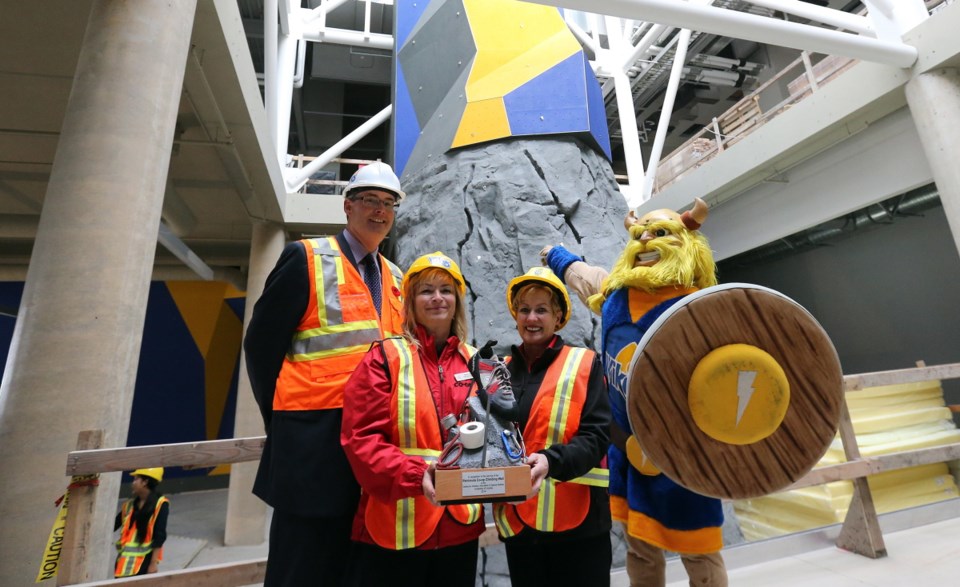Sixteen metres of plywood and simulated rock has become the first corporately named structure at the University of Victoria.
The Peninsula Co-op Climbing Wall was unveiled Tuesday at UVic’s Centre for Athletics, Recreation and Special Abilities, known as CARSA. The wall — the tallest climbing structure at a university in B.C. — is a focal point at the entrance to the CARSA complex, a $77-million project due for completion in May 2015.
CARSA will also be home to a new gymnasium for varsity sports, a field house featuring an 80-metre sprint track and space for UVic’s CanAssist program, which develops customized equipment and technology for the disabled.
“We thought it would be really good community leadership to be the first corporate donor and sponsor,” said Peninsula Co-op board member Patti Hunter. “We’ve had a long relationship with the university.”
Hunter said the Co-op likes to back causes for young people, and CARSA fit the bill. “We believe in funding projects that help youth be more physically active and healthy.”
The amount of the Co-op’s gift to UVic was not disclosed, but it is part of an effort to generate $10 million in philanthropic contributions to CARSA.
Clint Hamilton, UVic’s director of athletics and recreation, said the Co-op donation was a big step for CARSA. “The funding model for the project has philanthropy as an important component.”
Corporate naming was recently added to UVic policy and is a natural fit for a multi-faceted project like CARSA, said Alison Ducharme, UVic’s associate director for corporate relations. “We’ve always had a naming policy on campus but it never included that stream of partnering with the corporate community.”
Ducharme said there was considerable consultation about the new direction with students, faculty and others. All current efforts at UVic to do with naming rights are linked to CARSA, she said.
“We’re in conversations now with other prospects, both on the philanthropic, individual-donor side as well as the corporate side.”
In the past, some people have expressed concern about corporate presence at UVic, and the need to limit its influence. Corporations have yet to make significant inroads in the food sector at the university, one of only a few in Canada without a chain food outlet. The recently renovated food court in University Centre, made up of eight food booths, has no food-chain outlets.
Student Jessica Elliott, a member of the UVic Outdoors Club, said the climbing wall is a worthy addition to the university’s recreational facilities. She said she has been climbing for a few years and has made use of other indoor-climbing venues in the region. “It’s just going to be really nice to have our own on campus,” said the 25-year-old, a second-year geology student.
Hamilton said the climbing wall will be accompanied by a “bouldering” area — bouldering is a form of climbing without ropes and harnesses — that peaks at four metres.
The intent is for people “across the abilities spectrum” to use the wall, Hamilton said. “The climbing tower is really designed for beginner and intermediate climbers, although with the height, advanced climbers will use it as a training facility.”
He said the wider community will be able to use the climbing facilities and other parts of CARSA.



